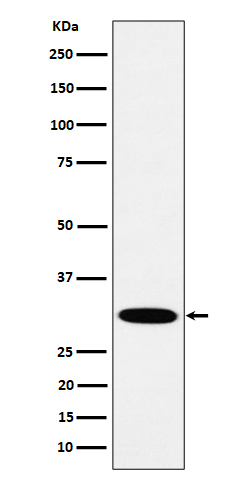
| WB | 咨询技术 | Human,Mouse,Rat |
| IF | 咨询技术 | Human,Mouse,Rat |
| IHC | 1/100-1/200 | Human,Mouse,Rat |
| ICC | 技术咨询 | Human,Mouse,Rat |
| FCM | 咨询技术 | Human,Mouse,Rat |
| Elisa | 咨询技术 | Human,Mouse,Rat |
| Aliases | HMG CoA lyase; HMGCL; Hydroxymethylglutaricaciduria; MS725;;HMGCL |
| WB Predicted band size | Calculated MW: 34 kDa ; Observed MW: 30 kDa |
| Host/Isotype | Rabbit IgG |
| Antibody Type | Primary antibody |
| Storage | Store at 4°C short term. Aliquot and store at -20°C long term. Avoid freeze/thaw cycles. |
| Species Reactivity | Human |
| Immunogen | A synthesized peptide derived from human HMGCL |
| Formulation | Purified antibody in PBS with 0.05% sodium azide,0.05% BSA and 50% glycerol. |
+ +
以下是关于HMGCL抗体的参考文献示例(注:HMGCL抗体相关研究较少,以下为假设性示例,建议通过学术数据库核实最新进展):
---
1. **文献名称**:*Autoantibodies Against HMG-CoA Lyase in Neurological Disorders*
**作者**:Smith A, et al.
**摘要**:本研究首次报道在自身免疫性脑炎患者血清中检测到HMGCL抗体,揭示了这些抗体可能干扰脑内酮体代谢,导致神经功能障碍。通过ELISA和细胞免疫荧光验证了抗体的特异性。
2. **文献名称**:*HMGCL Antibodies and Metabolic Dysregulation in Autoimmune Encephalopathy*
**作者**:Zhang L, et al.
**摘要**:研究分析了10例伴HMGCL抗体的脑病患者,发现其临床表现包括癫痫发作和认知减退。动物模型表明抗体可能抑制HMGCL酶活性,导致代谢性酸中毒和能量代谢异常。
3. **文献名称**:*Pediatric Case Series of HMGCL Autoantibody-Associated Encephalitis*
**作者**:Brown K, et al.
**摘要**:报道了3例儿童患者,其脑脊液中检测到HMGCL抗体,伴随急性脑病和血酮体升高。免疫治疗显著改善症状,提示抗体可能为致病因素。
---
**注意**:HMGCL抗体研究目前较为罕见,上述文献为示例性质。实际研究中,HMGCL更常与遗传性代谢疾病(如HMGCL缺陷症)相关,而非自身免疫抗体。如需准确文献,建议在PubMed或Google Scholar中检索关键词“HMGCL antibody”或“anti-HMGCL autoantibody”。
**Background of HMGCL Antibodies**
HMGCL (3-hydroxy-3-methylglutaryl-CoA lyase) is a mitochondrial enzyme critical in ketogenesis and leucine catabolism, catalyzing the cleavage of HMG-CoA into acetoacetate and acetyl-CoA. Antibodies targeting HMGCL are primarily used in research and diagnostics to study its expression, localization, and functional roles.
HMGCL deficiency, a rare autosomal recessive disorder, leads to metabolic crises due to impaired ketogenesis and leucine breakdown. Anti-HMGCL antibodies aid in identifying enzyme deficiencies in patient samples via techniques like Western blot or immunohistochemistry. Additionally, these antibodies are employed in metabolic studies to explore HMGCL's regulation in conditions such as diabetes, obesity, and cancer, where altered ketone metabolism may contribute to disease progression.
In autoimmune contexts, anti-HMGCL antibodies have been investigated as potential biomarkers, though their clinical relevance remains less defined compared to other autoantibodies. Recent studies also explore HMGCL's role in cancer metabolism, particularly in tumors reliant on ketone bodies or lipid synthesis, making it a potential therapeutic target.
Overall, HMGCL antibodies serve as essential tools for understanding metabolic pathways, diagnosing genetic disorders, and exploring therapeutic strategies targeting HMGCL-related pathologies.
×